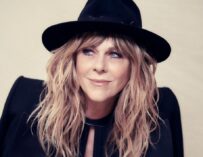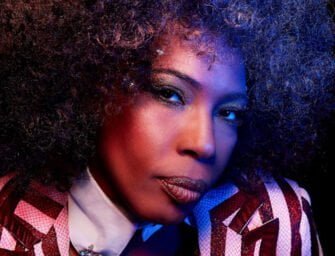
Judith Owen: “For me the art of songwriting is a direct line from the interior to the exterior.” Photo: Greg Shappell
The Welsh singer-songwriter tells us about her evolving relationship with her songs and their role in her battle against depression
Welsh singer-songwriter Judith Owen may be over two decades into her career but her music sounds as fresh as ever. A talented pianist and vocalist, she has always been able to imbue her songs with wit, compassion and a keen eye for detail. Her most recent album, 2016’s Somebody’s Child is yet another example of her observational gifts. More outward-facing than her previous albums but no less compelling, it builds on success of 2014’s critically acclaimed Ebb & Flo. It’s reassuring to know that Owen still has plenty left to say.
We recently had a chat with Judith before she took to the stage at Cleveland’s House Of Blues to learn a little more about the huge role her songwriting has played in her life…
Has your relationship with the songs changed over time?
“It’s a very pertinent question, Somebody’s Child came out last year and got some fantastic reactions but I’m not the kind of person that likes to keeps singing the same songs. I’m a prolific writer who is always moving forward, so even in performing these songs live they change. They have to, otherwise the boredom factor kicks in and you can’t let that happen because you’re then letting the audience down. What I’ve now really developed is that it’s become a much more muscular set of songs. The songs are the songs and they remain the same but by changing the musicians I’ve been able to keep it fresh.
“I actually went out with some strings this time. I had my three string players and I was doing all the bass parts on the piano and by doing this you are reinventing the song and it really helps make it feel like it’s the first time that you’re playing it. I’m one of those performers who never plays or sings exactly the same, I play the song and there is the structure and the song and the arrangement but I always take risks and take chances singing, I improvise. That’s where my love of jazz is really influential. All my musicians are the same, we’re all very jazz and pop and rock influenced but there’s that area where we all know how to improvise. Every time I perform and every time I start singing the song I get back to exactly the place that it’s from and I think that the longer you play them, the more sense the lyrics make.”
Why do you think that happens?
“I write very quickly, in about ten minutes – melody and the most important lyric, which is usually what the song is about. Then it takes me a couple of weeks to fine-tune the lyrics, I could go on for ever but I try to hold it down so it doesn’t get crazy. That’s the fine-tuning period but they’re out and they’re fast. As time passes it’s the strangest thing, and I guess that’s why people say you’re channelling something or it’s coming from the subconscious, because much later I’m singing my lyrics and I’m actually getting more meaning out of them and I think that’s quite typical of many songwriters.
“I don’t think you’ll ever really know how it comes or why it’s so fast and thrilling, you’re just very grateful for it. If I listen back to an album of mine from years ago I am in shock because I can’t believe it’s me. It’s a strange thing it really is, but mostly I’m shocked at the words because I am always struck by how much greater the meaning is than I originally thought and that’s what I mean by it coming from the subconscious. For me the art of songwriting is a direct line from the interior to the exterior, from what’s going on inside straight out into your voice and into the keys. That’s an amazing thing which I will never stop being utterly grateful for. I’m always very depressed when I don’t write for a while, I get very worried because I think I’ve lost the gift and then I’ll do it and it’s like ‘Thank God!’”
Do you have to be in a particular place for that to happen or do you just have to be ready it?
“I think the latter, you just have to be open and ready for it to come. It’s particularly hard when you’re on the road. It’s a good place to try things out, rehearse and work things in, but as far as writing goes it can be very hard. I’m not a guitarist, I’m a pianist and that gets tough. It’s not like I can suddenly whip out my instrument. Luckily I’ve got a small keyboard on the tour bus with me now so I do in fact get to sit in the bus and work on things but I’m not someone who sits down and forces myself to write. When it comes it comes, just be ready for it, that’s how it is.

Judith: “Even if we’re writing fictitious things or singing in the third person, it has to be the authentic voice.” Photo: Greg Shappell
“I always carry my phone so that I can record any melodies which come into my mind and they come in constantly. I would say to any songwriter just make sure you’ve always got a phone on you so that you can record every idea that you have. I’m humming everywhere, I’m out walking the dog and I’m humming, everybody must think I’m mad. The thing I know about songwriting is that if you hit upon a great melody or chord structure don’t think you’ll remember it in an hour, even 20 minutes. If you have time to work on it and to practice or keep going, you will have changed it in a matter of minutes.”
That first idea is often the most important one for you?
“The first idea that comes, you need to get down! Even if you don’t use it or it improves, it doesn’t matter. Try and get the first thought and put it down. The brain is full of information and if I think of a really great lyric I can’t wait until I get home because it will be gone. I’ll have changed it in some way and it will have lost its rhythm or its meaning. That’s why we may as well be married to our phones at this point. You want immediacy, it doesn’t matter if people think you’re crazy, just sing into it, talk into it, write into it, get it down.
“I’ve found that as a writer I sometimes belabour stuff and then I come back to the first thing that I wrote and it’s so much more exciting and pure and it gets to the point with clarity. You can keep editing yourself and you can be your own critic but we all get carried away and we all forget things. I learnt that pretty quickly after a couple of times where I thought, ‘I’ll remember that,’ and I didn’t. You always need to be armed.”
What influences your writing?
“You write about what you know. I am that confessional singer-songwriter and I’m introspective insomuch as I’m always trying to be emotionally authentic. I think that’s where the singer-songwriter really exists at their strongest. Even if we’re writing fictitious things or singing in the third person, it has to be the authentic voice and that is basically the person who is talking from experience and really does know what they’re talking about.
“Music and writing has been the best form of self-medication I have ever had and I think that works for a lot of musicians and writers. It’s a means to express when you do not have a place to put the things that trouble you. Finding a voice or a place where you can actually have a voice is one of the most amazing, liberating and life-saving things that you can have and I believe that is why people are drawn to the arts because it’s not safe to do that in real life. It’s safe in art, you can say anything in art through creativity but you cannot in real life, it’s still not accepted.
“I have struggled with depression my whole life. My mother had terrible mental illness, she was taken by it and was ruined by her depression and ultimately she died from it. I have the same make-up and I wanted more than anything to be okay. She was an example to me and in the house in which I grew up which was on the one hand filled with music and joy of my opera singer father who was remarkably wonderful at Covent Garden for 35 years where I was backstage all the time and saw the escapism of music and the joy of it and then in the home there was fear and darkness and a constant stress and anxiety that something terrible was going to happen, and it did.”
Music provided you with a release…
“The way that I expressed it and got through was by sitting at the piano and writing. I could have done all sorts of stuff to numb myself but luckily I had the gift and the love and I had that DNA and I found that amazing place to express myself. Many of us find it in music, acting, writing, poetry or dance. There are ways of expressing ourselves that a lot of kids aren’t exposed to. I was very fortunate that I was immersed in music through my dad but a lot of people are lost and they don’t have that outlet. It’s not a thing of choice and that’s how it is with a lot of musicians, especially singer-songwriters. You must do it, it is absolutely imperative that you do it otherwise you don’t really feel complete as a human. I count myself very fortunate that I have these skills because I do not think I would be okay today if I did not.”

Judith Owen: “With every single album that I have recorded you can hear how I am doing and how well I am.” Photo: Matthew Becker
Do you think that can be heard in your songs?
“With every single album that I have recorded you can hear how I am doing and how well I am and you can see my road to being a complete human being again. Jumping forward eleven albums to Somebody’s Child, the reason that it’s an outwardly looking album is because I’m so much healthier than I have ever been in my entire life. I’m not saying it’s gone, it never will, but I manage it and I’m on the other side of it. I still have to manage it every single day but here I am singing from the perspective of someone who doesn’t only look inwards now and that’s a gift. Having depression means that you are constantly asking questions and looking inwards. That makes for really great songwriting but boy am I relieved to now look outside myself with this record.
“I started with the title track because I did see a mentally ill beautiful young black girl on the streets of New York City in the dead of winter in the snow wearing two rubbish bags as a top and a skirt, crazy on drugs, singing and smiling and nearly nine months pregnant. I turned the corner and was faced with this sight and, of course, as someone who is steeped in mental illness, when faced with it I ran across the street to avoid seeing this thing that I know so well. Then at the other side I was like, ‘What are you doing, this is somebody’s child, naked on the street and having a baby’. The whole point of the song is that I know how fragile and close to the edge we all are and how easy it is, with a bit of bad brain chemistry and bad luck, to end up destitute. She was an extreme example but I know people who have lost everything because of their mindset and the experiences they’ve had. It could have been me too if I hadn’t found the one thing that’s been a constant rock and anchor in my life. That’s how this whole album came about.”
Was it all coming from that different perspective?
“It was about the fact that when you’re an inward looking person you’re obsessing about yourself and you’re missing the most important stuff in life. That’s the theme of the whole album. Of course it’s also about me, that’s all I can really talk about, but I know ultimately that it’s about all of us because we all miss the big stuff. It’s my illness that keeps me looking inwardly but I am also one of those people who wants everything now, want answers this minute and I think what I’m doing in my life is all so massively important. It’s not, it matters not a bit compared to the small stuff that is all around us and the big stuff like what we’re really doing to each other.
“As a writer I still know that the point of my music is to entertain people and that’s always been a major feeling in me. Firstly my job is to give the audience and the listener permission to feel. I am an emotional musician, I write the kind of music that allows people to go in deep and hear what I’m saying and let me say it for them. So you can cry and you can laugh and you can feel these things. My job is also to write melodies that are beautiful, or that you want to sing along to. Write things that entertain you and lyrics that are emotionally intelligent, make you think and go in on a deeper level. The music grabs you first and then the lyrics come in and really take you by surprise, to me that is the songwriter’s job.”
It sounds like being a songwriter really is incredibly important to every aspect of your life?
“It’s an amazing thing to get to do. When I was in my teens and twenties I had no idea how fortunate I was to have this in my life but with age I know how amazing it is to have that gift. I would just say to any singer-songwriter that has put their thoughts into words, music and lyrics to really treasure it and acknowledge how fortunate you are. To be someone who creates their own world and have the courage to expose yourself and have that authentic voice is a very special thing.”
Interview: Duncan Haskell
Somebody’s Child is out now. All the latest news can be found at judithowen.net




































Related Articles